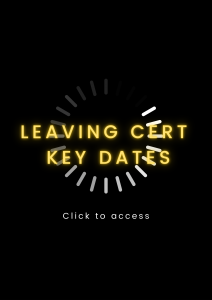The majority of us have been there: it’s the run up to the Leaving Cert and you’re too afraid to sneeze in case a quote from Peig or a highlighted passage from Soundings escapes.
A complete information overload, and if you left things till last minute this information overload was administered in a matter of weeks before the opening of the pink or blue exam sheets. Many parallels can be made between the run up to the Leaving Cert and preparing for a job interview.
For one, they are both environments which which the participant is not very familiar. In both cases, information management is key. Many Leaving Certificate students favour cue cards and this approach can be adopted in preparation for a prospective interview.
When preparing for an interview it is imperative to highlight what the employer is looking for, whether it is a good communicator, a logical thinker or a dynamic sales person. The bottom line is that it is your job to communicate your suitable attributes to the employer as often as possible throughout the interview.
For this purpose cue cards can be a help in preparing for a questions and answers obstacle course.
So you have scribbled down a long list of possible questions you think you could be posed with, rehearsed this long list and you’re still feeling uneasy. That’s natural: when you focus too much on the interviewer’s possible questions, you soon realise the list is endless.
My advice is to get your hands on the job spec for the role , study it closely, and then proceed to jot down on these cue cards the skills and attributes you possess that mirror this document. However, don’t lie. In an interview do not try to be someone else, but bring the more confident you that will vouch for your skills and experience.
Having a number of notes on these cards is half the battle. You have divided your workload, the smaller the information intake is, the more precise and exact the answers can be.
In an interview environment your reply must answer the interviewer’s question. What many people fail to realise though is that once this stipulation is adhered to one can take the question anywhere they wish.
For instance, in the closing stages of the interview you could be asked the routine enquiry ‘now, is there anything you would like to ask us’? The majority of candidates reply to this with an understandably meek ‘no’.
I suggest take this opportunity to again highlight something about yourself, something that reinforces your case for securing the role. ‘I am just wondering what is the company’s stance on continuous professional development as I am very interested in having the most up to date knowledge of my field as I possibly can?’
As you can see it is still a question but it gives the interviewer some reassurance that you are ambitious and determined.
Back to the cue cards, they will help you organise your information into concise, digestible snippets so that you can focus on the most relevant and important information about yourself. When studying these cards ask yourself ‘is the information I am relaying emphasising my attributes’?.
Just like a Leaving Cert student does with their cue cards, revise the most applicable information. The only difference between you and a Leaving Cert student is that you have a huge advantage because you are the actual learning material.






